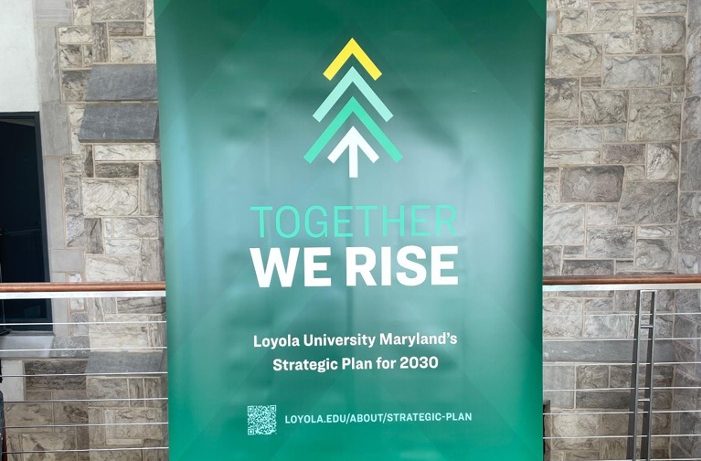President Terrence M. Sawyer, J.D introduced this year’s Together We Rise strategic plan at a town hall meeting on Feb. 15 targeted toward students, faculty, staff, and administrators. The plan included voices from faculty, staff, administrators, students, alumni, and trustees. Professor and Co-chair of the committee, Paola Pascual-Ferra said the process mobilized people and brought a diverse group of individuals together to implement initiatives and achieve goals that will benefit the Loyola community.
“Loyola is a phenomenal institution, but like President Sawyer said, it needs a little fine-tuning in efficiencies of how we operate and really maximizing our strengths. We have not done a good job because we have not coordinated our efforts better. The name of the plan, Together We Rise, really does emphasize the importance of coordination across the university,” Pascual-Ferra said.
Within the outline of Together We Rise, there are four main areas: Advance, Grow, Care, and Thrive. Vice President of Enrollment and Co-chair Eric Nichols said the strategic plan is a roadmap providing the big picture of the future of the university.
Advance focuses on two aspects, advancing support for students and faculty, and advancing support in mission and school spirit. The support for students involves the creation of a framework through providing resources such as student success coaches and an increase in wellness staff including staff psychologists. Together We Rise also discusses methods to increase retention and graduation rates.
The plan details the support of faculty through the creation of a center for faculty excellence. Here, staff members could access resources to help with scholarship work, tactics to improve teaching, and learn the efficient utilization of technology. Nichols said the mission and school spirit are about making current students feel good about their community, as well as enhancing what prospective students look for in schools.
“The mission and school spirit is recognizing that we are not just here to provide students with an education, but provide them with a fun experience because that’s what is great about college. It’s an opportunity for us to focus on that to see how we can do even better,” Nichols said.
Grow pertains to growing not just the undergraduate and graduate student population size, but expanding health and STEM programs. Such programs include the introduction of a new nursing program and potentially, new majors in environmental sciences and studies. Nichols believes these growth initiatives will provide Loyola the ability to gain more revenue and invest that money back into the institution.
“That growth is partially to pay for all the things we want to do in the plan. We need to increase revenue and that revenue comes from tuition,” Nichols said.
Thrive focuses on the investment of Loyola’s thriving team, including faculty, staff, and administrators. According to Nichols, Loyola wants to do a better job of taking care of its own employees. He believes that if Loyola employs people who are content, satisfied, and enjoy working here, then it will cascade down to the people they are working with, including students.
“I think it’s nice that in the plan we are public upfront that we want to do a better job of making this a great place to work. We are looking at improvements in compensation, benefits, and professional development opportunities,” Nichols said.
Lastly, Care is dedicated to two areas: care for our common home and cultivating a community of belonging. Nicols believes care for our common home is focused not only on becoming a more sustainable campus through integral ecology but taking on sustainable practices.
“We want to update our climate action plan and reduce our greenhouse gas emissions. We also want to move up on the Princeton Review Guide of the Most Green Colleges and for Loyola to be recognized as a leader in sustainability,” Nichols said.
The cultivation of community and belonging looks further into enhancing and investing in our Chief Equity and Inclusion office. According to Nichols, Loyola is looking to create more support in that area and ways to increase support for students throughout the university.
“We are going to increase support for our LGBTQIA+ students by hiring additional staff and help. Right now it is not clear who they might go to if they have questions or need support, so that is something we want to do not just for our students, but also faculty, staff, and administrators,” Nichols said.
The implementation of the plan is staggered. While some initiatives start next year, others will start in year two depending on a budget and timing standpoint. Pascual-Ferra says she thinks this plan is going to be a game changer, especially when it comes to its impact on students.
“My hope is that it really does help us to get to that next stage, that next phase of Loyola where we are operationally efficient. Where everyone is kind of understanding what Loyola is about,” Pascual-Ferra said.










































































































